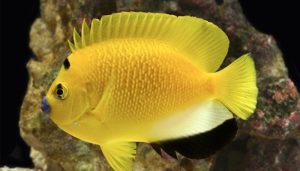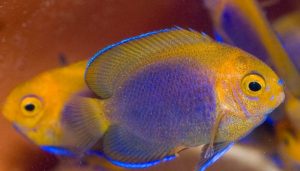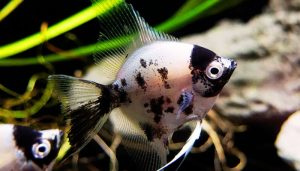Do guppies need a filter in their tank to survive? Filters are critical in maintaining good water quality and providing oxygen for your guppies to thrive. Without a filter, the water can quickly become polluted, leading to various health issues and even death for your fish.
This blog post explores the three benefits of using a filter in your guppy tank. From removing harmful toxins to ensuring optimal oxygenation, you’ll discover why a filter is essential for any guppy owner.
We’ll also provide tips on choosing the right filter for your tank and how to maintain it for optimal performance.
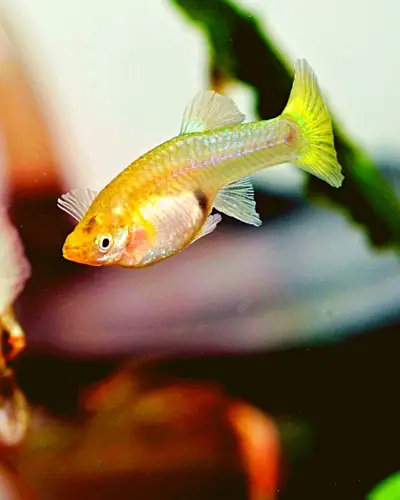
Do guppy need filter, don’t put your guppies at risk – learn why a filter is a must-have for any guppy tank and how it can help ensure your fish live long, healthy lives.
Table of Contents
ToggleDo Guppies Need a Filter To Survive?
Do guppies need a filtered tank? Yes, guppies benefit significantly from having a filter in their tank. Guppies need a filter in their tank to maintain the quality of water. A filter helps remove excess waste, leftover food, and other pollutants from the water.
Without the filter, the water can quickly become polluted, leading to poor living conditions for them. Guppy fish need oxygen, A filtration system ensures that the water remains clean and oxygenated, which is crucial for the health and well-being of the guppies.
While guppies can technically live without filters, having one to provide them with a suitable and healthy environment is highly recommended.
A filter helps to keep the water free from harmful substances and maintains appropriate water parameters, such as pH levels, ammonia, and nitrate levels. Therefore, to ensure the longevity and happiness of your guppies, it is essential to include a filter in their tank.
What are the key benefits of using a filter for guppies?
There are three key benefits of using a filter for guppies:
1. Filtration: A filter helps to remove debris, waste, and harmful substances from the tank water, keeping it clean and clear.
2. Oxygenation: Filters introduce oxygen into the water by creating water movement, which is essential for the well-being of guppies.
3. Biological Balance: Filters establish a beneficial bacterial colony, which helps break down harmful ammonia and nitrites the fish produces.
Can Guppies Survive Without A Filter?
Can guppies live without a filter? While guppies can survive without a filter, it is not recommended. Filters are critical in maintaining good water quality and providing the necessary oxygen for the fish to thrive.
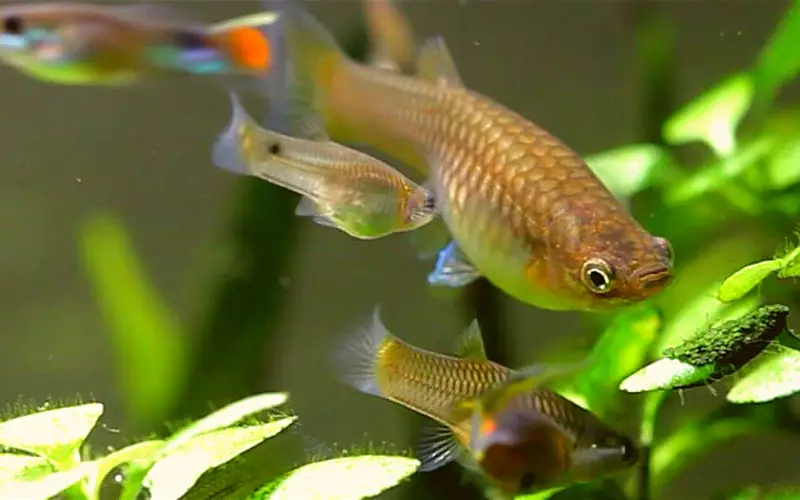
Does guppy need filter? Without a filter, the water can quickly become polluted, leading to various health issues and a shortened lifespan for the fish. Therefore, using a filter in your guppy tank for optimal health and longevity is best.
What Is The Purpose Of Aquarium Filters?
The purpose of aquarium filters is to maintain the water quality in the tank. They perform several vital functions:
- Mechanical Filtration: Filters remove physical debris such as uneaten food, fish waste, and plant matter from the water. This helps to keep the water clear and prevents the buildup of harmful substances.
- Chemical Filtration: Some filters use activated carbon or other chemical media to remove impurities, toxins, and odors from the water. This helps to create a healthier and more pleasant environment for the fish.
- Biological Filtration: Filters provide a medium for beneficial bacteria to grow. These beneficial bacteria help to break down harmful ammonia and nitrite produced by fish waste into less toxic nitrate. This process, known as the nitrogen cycle, is crucial for maintaining a stable aquarium to keep guppies healthy.
- Oxygenation and Water Circulation: Filters help to oxygenate the water by creating surface agitation and water movement. This ensures an adequate oxygen supply for the fish and other aquatic organisms. Additionally, water circulation helps to distribute heat, nutrients, and oxygen evenly throughout the tank.
Aquarium filters are vital in maintaining a clean and stable aquatic environment, promoting the health and well-being of the fish and other inhabitants.
The Importance of a Filter for Guppies
What Are The Benefits Of A Filter In Your Guppy Fish Tank? Before diving into the benefits, it’s essential to understand why a filter is crucial for guppies.
Guppies are active swimmers, producing waste that can quickly accumulate in the tank. Without proper filtration, the water quality can deteriorate rapidly, leading to various problems such as ammonia spikes, nitrite poisoning, and low oxygen levels.
A filter helps to maintain a healthy and stable aquatic environment for your guppies.
Benefit 1: Maintaining Water Quality
One of the primary benefits of using a filter in a guppy tank is maintaining water quality. The filter removes physical and chemical impurities from the water, such as uneaten food, fish waste, and excess nutrients. These impurities can lead to ammonia and nitrite spikes, which are highly toxic to fish.
By continuously circulating and filtering the water, the filter helps to eliminate these harmful substances, creating a cleaner and healthier environment for your guppies.
Benefit 2: Oxygenation of the Water
Proper oxygenation is vital for the well-being of any aquatic organism, including guppies. In a closed tank environment, the oxygen levels can deplete over time, mainly if the tank is densely stocked.
A filter plays a crucial role in oxygenating the water by creating surface agitation and promoting gas exchange. Water flow across the surface facilitates oxygen absorption from the air and the release of carbon dioxide. This ensures that your guppies have an ample supply of oxygen for their respiratory needs.
Benefit 3: Removal of Harmful Substances
In addition to maintaining water quality and oxygenation, a filter also helps to remove other harmful substances from the guppy tank. It can filter out heavy metals, excess chemicals, and organic compounds that may accumulate over time.
These substances can adversely affect your guppies’ health, causing stress, diseases, or even death. By effectively removing these harmful substances, a filter provides a safer and more suitable habitat for your guppies to thrive.
Remember: Plants can also aid in managing anaerobic bacterial activities by absorbing carbon dioxide from the substrate through their roots.
Do Baby Guppies Need a Filter?
Do guppy fry need a filter? Yes, baby guppies do need a filter in their tank. A filter helps to maintain water quality by removing waste, excess food, and other debris from the water.
It also helps to circulate and oxygenate the water, which is essential for the health and well-being of the fish. Additionally, a filter can provide a gentle current that helps baby guppies develop their swimming abilities.
What Filters are Best for a Guppy Tank?
Do guppys need a filter? When choosing the best filter for a guppy tank, there are a few factors to consider. One of the most popular and effective options is the hang-on-back (HOB) filter. HOB filters are easy to install and maintain and provide excellent filtration for guppy tanks.
These filters work by sucking up water from the tank, passing it through a series of filter media like sponge and activated carbon, and then returning the clean water into the tank. They are known for their efficient mechanical and chemical filtration capabilities, effectively removing debris and harmful substances from the water.
Additionally, HOB filters provide excellent water circulation and aeration, which is essential for the health and well-being of guppies. The HOB filter is a perfect choice for guppy tanks because it is efficient, easy to use, and can be customized with different filter media to suit the specific needs of guppies.
How To Maintain A Guppy Tank Without A Filter?
Maintaining a guppy tank without a filter is challenging, but it can be done with extra effort and attention. Here are some tips:
- Perform frequent water changes: If you keep Guppies without a filter, the water quality can deteriorate quickly. It’s vital to perform more frequent water changes to remove excess food, waste, and other debris.
- Use live plants: Live plants can help absorb some of the waste and provide oxygen for the fish. They also contribute to a more natural and aesthetically pleasing environment.
- Add an air pump: An air pump can help increase the oxygen levels in the water and improve circulation.
- Avoid overfeeding: Overfeeding can quickly lead to excess waste and pollution in the tank. Feed your adult guppies only what they can consume in a few minutes.
- Monitor water parameters: Regularly test the water for ammonia, nitrite, and nitrate levels. If the levels are high, perform a water change immediately.
Remember that while these tips can help maintain a guppy tank without a filter, using a filter is still the best way to ensure optimal water quality and a healthy environment for your fish.
Commonly Asked Questions (FAQs)
Do I need to keep the filter running 24/7 in a guppy tank?
Do guppy fish need a filter 24/7 ON? It is essential to keep the filter running continuously to maintain optimal water quality and provide continuous oxygenation for your guppies.
How often should I clean the filter?
The filter cleaning frequency depends on the filter type and the tank’s stocking levels. Generally, it is recommended to clean or replace the filter media every 2-4 weeks to prevent clogging and maintain efficient filtration.
Can I use a sponge filter for my guppy tank?
Yes, sponge filters are an excellent choice for guppy tanks, especially for guppy fry (baby guppies) and heavily planted tanks. They provide gentle filtration and a surface for beneficial bacteria to colonize.
Are there any alternative methods to a filter for maintaining water quality in a guppy tank?
While a filter is the most effective method, you can also consider regular water changes, live plants, and chemical filtration media as supplementary measures to maintain water quality.
Can I use a filter in a small guppy tank?
Absolutely! Filters come in various sizes, including ones suitable for small tanks. Choosing a filter that matches the tank’s size and provides adequate filtration without creating excessive water flow for the guppies is crucial.
Can guppies survive without a filter?
Can guppies live without filter? Guppies can survive without a filter but thrive better with one. The filtration provided by a filter ensures better water quality, which is crucial for the overall health of guppies.
What type of filter is recommended for a guppy fish tank?
Various types of filters are available for guppy fish tanks, including canister filters, internal filters, and sponge filters. The choice depends on the tank size and personal preference.
How many guppies can I keep in a tank without a filter?
The number of guppies you can keep in a tank without a filter depends on the tank size, the number of live plants, and the frequency of water changes. It is generally recommended to have fewer guppies in a tank without a filter compared to a tank with a filter.
Do guppies produce a lot of waste?
Guppies produce waste, especially if you have many guppies in a tank. The waste can accumulate quickly, leading to poor water quality. Having a filter helps in removing this waste efficiently.
How often do I need to change the water in a tank without a filter?
Water changes in a tank without a filter should be done more frequently than in a tank with a filter. The frequency depends on the tank size, the number of guppies, and the overall water quality. It is generally recommended to perform partial water changes weekly to maintain optimal conditions for the guppies.
Can I use an air pump instead of a filter?
While an air pump creates water movement and helps oxygenate the water, it does not provide the same level of filtration as a dedicated filter. Using a filter and an air pump for better aquarium water quality in a guppy fish tank is recommended.
Can guppies survive in an aquarium without a filter?
Does a guppy tank need a filter to survive? Guppies can survive in an aquarium without a filter, but their health and well-being may be compromised. The absence of a tank filter can lead to poor water quality, negatively impacting the guppies’ health and lifespan.
Can I use an internal filter for my guppy tank?
Yes, an internal filter is a popular choice for guppy tanks. It provides efficient filtration while taking up minimal space inside the tank. It is essential to choose an internal filter appropriate for the tank size and consider the flow rate to ensure the well-being of the guppies.
Can guppy live without filter?
Guppies can technically survive without a filter, but it’s not ideal. Filters remove harmful toxins and maintain water quality, crucial for guppy health. Consider a smaller tank with live plants and frequent water changes for a filter less setup.
Do guppies need filter?
Do guppies need filters? Yes, guppies need a filter! It keeps their water clean by removing waste and maintaining good oxygen levels. While very low-maintenance, a filter is essential for a healthy guppy tank.
What is the best filter for guppy tank?
Sponge filters are generally considered the best filter for guppy tanks. They provide excellent biological filtration and gentle water flow, perfect for guppies’ small size and fry.
What temperature do guppies need?
Guppies thrive in warm, tropical waters. Aim for a range of 74-82 degrees Fahrenheit (23-28 degrees Celsius) for optimal health and breeding.
Do tetras need a filter?
Yes, tetras need a filter for good water quality. Filters remove waste and toxins harmful to tetras, and some provide oxygen. Choose a filter with a flow rate suitable for your tank size.
Can I keep a guppy without an air pump?
In some cases, yes. Guppies need oxygen, but air pumps aren’t always required. Well-planted tanks with good surface agitation can provide enough oxygen.
Can guppies breathe air?
No, guppies cannot breathe air directly. Like most fish, they extract oxygen from the water through their gills. However, guppies need oxygen-rich water to survive.
Do guppies need heated water?
Guppies thrive in warm water, ideally 76-78°F. A heater is recommended for stable temperature, but guppies can survive in cooler water (down to 64°F) with lower activity and breeding rates. While guppies need oxygen, a heater itself won’t directly impact oxygen levels. Ensure good water flow and surface agitation for oxygen exchange.
Conclusion
So, do guppies need a filter? In conclusion, using a filter in a guppy tank is highly beneficial and strongly recommended. It helps maintain water quality by removing physical and chemical impurities, ensuring proper fish oxygenation, and eliminating harmful substances that can compromise their health. Investing in a good quality filter and regularly maintaining it can create a clean, healthy, and stable environment for your guppies to flourish.
You might also like
- Can Guppies Live with Bettas Safely: 7 Easy Tips to A Peaceful Tank
- Do Guppies Like Currents: 5 Reasons Why Yes! (Revealed)
- Guppy Fish Tank Size – Structure Your Guppies Tank in Just 6 Steps
- Feeder Guppies fish: A Comprehensive Guide to Breeding Guppies
- Do guppy fish need a heater: A Comprehensive Beginner’s Guide
- How Many Guppies Should Be Kept Together? (Solved)
- What Do Guppy Fry Eat: 5 Nutritional Foods for Rapid Growth!
- How Long Can Guppies Go Without Food: (Solved & Explained)
- Dropsy Guppy Causes, Symptoms & Best Treatment
- Can Guppy Fish Live with Angelfish: Shocking Revelation Revealed!
- Guppy Constipation Symptoms 101: Causes & Best Treatment!
- Do Guppies Need Air Pump: The ANSWER Will SHOCK You!
- Can Guppy Fish Live Without a Filter: Here’s How to SAVE Them!
- What Do Guppies Like in the Tank: 7 Things Guppies LOVE
- Guppy Pregnant or Dropsy: Don’t Miss These Warning Signs!


